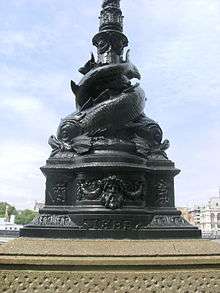Albert Embankment
Coordinates: 51°29′28″N 0°07′21″W / 51.4910°N 0.1225°W


Albert Embankment is part of the river bank on the south side of the River Thames in Central London. It stretches approximately one mile (1.6 km) northward from Vauxhall Bridge to Westminster Bridge, and is located in the London Borough of Lambeth.
History
Created by the engineer Sir Joseph Bazalgette for the Metropolitan Board of Works between July 1866 and November 1869, Albert Embankment included land reclaimed from the river and various small timber and boat-building yards, and was intended to protect low-lying areas of Lambeth from flooding while also providing a new highway to bypass local congested streets.
Unlike Bazalgette's Thames Embankment (including Chelsea Embankment and Victoria Embankment), the Albert Embankment does not incorporate major interceptor sewers. This allowed the southern section of the embankment (upstream from Lambeth Bridge) to include a pair of tunnels onto a small slipway, named White Hart Draw Dock, whose origins can be traced back to the 15th century. This is contrary to the popular myth that the dock was built and used by the nearby Royal Doulton's pottery works to transport clay and finished goods to and from the Port of London. From spring 2009, refurbishment of White Hart Dock commenced as part of an ongoing public art project being delivered by Lambeth council.[1]
Some of the reclaimed land was sold to the trustees of St Thomas' Hospital. To the north of Lambeth Bridge, the embankment is a narrower pedestrian promenade in front of the hospital, with motor traffic carried behind the hospital on Lambeth Palace Road.
In common with other Bazalgatte works, the original embankment is adorned with sturgeon lamp standards to the designs of George Vulliamy. The southern limit of Bazalgatte's embankment was opposite Tinworth Street, where the road moves away from the riverside.
The stretch south of Tinworth Street was occupied by industrial and wharf premises until World War II. These areas have subsequently been redeveloped as offices, with extensions to the embankment being constructed to a more utilitarian design than the Bazalgatte/Vulliamy stretch. Public pedestrian access to this newer embankment between Lambeth Bridge and the main road stretch of Albert Embankment was only secured in the 1990s. Parts of this section of the embankment have a provisional appearance, as the landowners still have hopes for future redevelopment that could move the embankment line further into the river. However, encroachment of the tidal river bed habitat is contrary to the current planning policies of Lambeth.
Albert Embankment is also the name given to the part of the A3036 road between Vauxhall Bridge and Lambeth Bridge, where it adjoins Lambeth Palace Road and Lambeth Road. On the west side of this road adjacent to Vauxhall Bridge is the Secret Intelligence Service (SIS) building, while on the east side nearer to Lambeth Bridge are the International Maritime Organisation (IMO) building and the former headquarters of the London Fire Brigade. In the Thames opposite is London's only river fire station, home to two fireboats.
See also
References
- ↑ "What's on". London Borough of Lambeth. Retrieved on 4 January 2009.
Further reading
- Winchester, Clarence, ed. (1938). "London's Riverside Highways". Wonders of World Engineering: Epics of Conquest in Story and Picture. London: Amalgamated Press. pp. 677–682. OCLC 13622656. Describes the construction of the Victoria and Albert Embankments.
External links
- White Hart Dock—Public Art & Community Engagement Project
- Survey of London entry (1951)